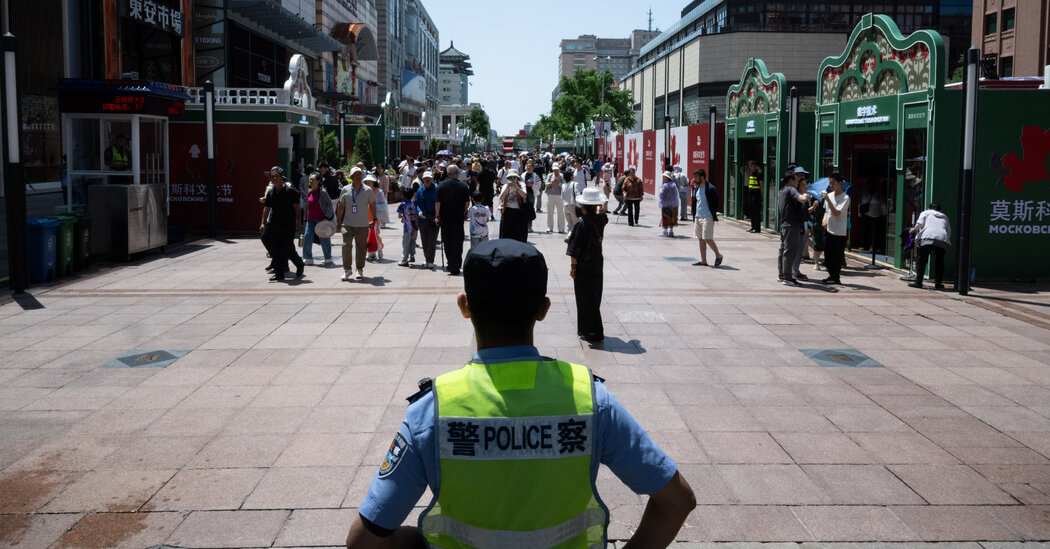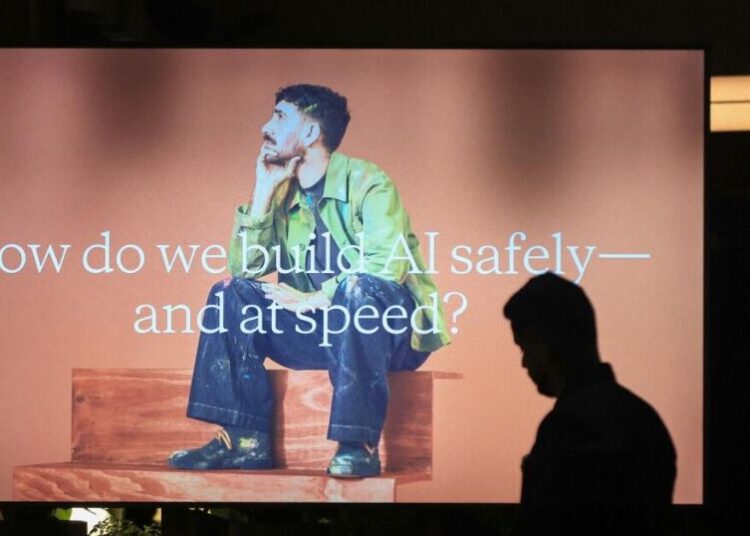
Every Monday morning, the stirring strains of China’s national anthem stream into my Beijing apartment from the elementary school across the street. Young students in uniform stand in neat rows on a freshly turfed playground as the Chinese flag inches up a pole. Nearby streets are lined with flower pots, ginkgo trees and propaganda signs exhorting citizens to love their nation.
For much of my life that directive had felt superfluous. China’s economy boomed and we were proud of our country.
That pride is harder for many of us to summon today. Behind the orderliness of everyday life, a quiet desperation simmers. On social media and in private conversations, there is a common refrain: worry over joblessness, wage cuts and making ends meet.
Chinese people today live with a strange paradox.
Internationally, China looks strong. It is America’s only rival in terms of the power to shape the world. The recent meeting between President Trump and President Xi Jinping of China, in which the leaders announced a trade-war truce, has fed this narrative — one that Beijing is only too happy to promote — a resilient nation united in the face of external challenges.
That muscular facade is punctured here in China, where despair about dimming economic and personal prospects is pervasive. This contrast between a confident state and its weary population is captured in a phrase Chinese people are using to describe their country: “wai qiang, zhong gan,” roughly translated as “outwardly strong, inwardly brittle.”
Many now feel the very state policies that have made China appear strong overseas are hurting them. They see a government more concerned with building global influence and dominating export markets than in addressing the challenges of their households. A state crackdown launched several years ago on the private sector is widely blamed for undermining middle-class livelihoods, even as financial resources are channeled into industries that the government deems more strategically important, such as electric vehicles, solar power and shipbuilding. Meanwhile, the global chokehold China has secured on the supply and processing of rare earth elements has caused air and soil pollution at home.
These days, there is a sense of bitter anger among the people at being the voiceless victims of the state’s obsession with world power and beating the United States. That sentiment is likely to grow. The latest five-year plan — the government’s blueprint of economic priorities — that was released last month makes clear it plans to double down on prioritizing national power over the common good.
In April, as the tariff war with the United States intensified, a People’s Daily editorial argued that Beijing can resist American bullying thanks to systemic advantages such as China’s ability to centralize resources and pour them into accomplishing national goals. The backlash on the Chinese internet was swift. While the government boasts, a viral social media post pointed out, everyday struggles like finding work, putting food on the table and educating children are “fraught with difficulty.” Winning the trade war with the United States means “preparing to sacrifice some of the people,” the author wrote. Censors soon blocked the post and others like it.
Years ago, Chinese people would have cheered a People’s Daily editorial like that out of the reflexive nationalism that the government has instilled for decades. That patriotism is nearly drowned out today by those who vent over the problems they face.
Youth unemployment is so high that last year the government changed its calculation methodology in a way that produced a lower number. Even the new figure remains alarmingly high. An estimated 200 million people get by in precarious careers in a gig economy. Consumers, many of whom have seen their net worth shrink in an intractable housing market crash, are cutting back on spending, trapping the economy in a deflationary spiral.
The sense of economic insecurity is leading people to forego marriage and starting families, worsening a national decline in population. Popular frustration also is sharpening the divide between the haves and the have-nots — hardening public resentment against those who are perceived as parlaying economic or political connections into opportunity while most people face dwindling prospects. And mental health problems are believed to be rising, as evidenced by a spate of indiscriminate stabbing sprees and other violent attacks in the past couple of years.
It seems clear that Beijing can no longer count on knee-jerk patriotism to underwrite its increasingly assertive stance abroad. In September, when the Chinese Communist Party staged a lavish military parade to commemorate the 80th anniversary of the end of World War II, many people wondered aloud why that money wasn’t instead spent on addressing the difficulties of ordinary people.
The government recently began cracking down on social media content it considered “excessively pessimistic” — a clear sign it is concerned about this public unease undercutting its agenda. But suppressing criticism instead of addressing its causes will only deepen the disconnect with the people and strain the balancing act that the state has tried to strike between its foreign policy priorities and the domestic support it craves.
China has long thrived under an unspoken social contract: The Communist Party granted the people more freedom to improve their livelihoods in return for political obedience. To many Chinese, the government is no longer holding up its end of the bargain.
When Mr. Xi took power in 2012, he gave China’s people hope with his oft-repeated mantra “the Chinese Dream”: a pledge of shared prosperity through national strength. That phrase has been less prominent in government messaging in recent years.
The state might say that’s because much of its vision has become reality. More likely, the Communist Party understands that such rhetoric now rings hollow among a population that is watching its dreams fade.
Helen Gao is a freelance writer based in Beijing.
The Times is committed to publishing a diversity of letters to the editor. We’d like to hear what you think about this or any of our articles. Here are some tips. And here’s our email: [email protected].
Follow The New York Times Opinion section on Facebook, Instagram, TikTok, Bluesky, WhatsApp and Threads.
The post China Looks Strong. Life Here Tells a Different Story. appeared first on New York Times.



